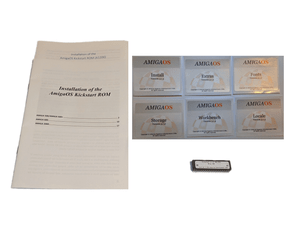Amiga Workbench 3.1 Adf Download

Amiga Workbench Roms
Manufacturer : Commodore | System : AmigaWelcome to the Commodore Amiga ROMs section of the ROM Database. Please scroll down for more sections and remember to share this page. You can also vote for your favourite system. | ||
| Commodore Amiga Section. This is one of the largest and most complete rom sets available. A500,A600,A1000,A1200,A2000,A3000,A4000 are all here. The Amiga is a family of personal computers sold by Commodore in the 1980s and 1990s. The first model, the A1000, was launched in 1985 and became popular for its graphical, audio and multi-tasking abilities. The Amiga provided a significant upgrade from 8-bit computers, such as the Commodore 64, and the platform quickly grew in popularity among computer enthusiasts. The name 'Amiga' was chosen because it is the Spanish word for (female) friend, and alphabetically it appears before Apple in lists of computer makers. It originated as a project code-named 'Lorraine', therefore the female was used instead of the male and general version Amigo. The best selling model, the Amiga 500, was introduced in 1987 and became one of the leading home computers of the late 1980s and early 1990s with approximately six million sold. The A3000, introduced in 1990, started the second generation of Amiga Systems, followed by the A500+ and the A600. Finally, as the third generation, the A1200 and the A4000 were released in 1992. However, poor marketing and failure to repeat the technological advances of the first systems meant that the Amiga quickly lost its market share to competing platforms, such as the fourth generation game consoles, Apple Macintosh, and IBM PC compatibles. Based on the Motorola 68000 family of microprocessors, the machine has a custom chipset with graphics and sound capabilities that were unprecedented for the price, and a pre-emptive multitasking operating system called AmigaOS. The original operating system, partly based on TRIPOS and written in BCPL, is called AmigaDOS and the GUI is called Workbench. When it was eventually renamed AmigaOS, the BCPL parts were rewritten in the C language. Although early Commodore advertisements attempt to cast the computer as an all-purpose business machine, especially when outfitted with the Amiga Sidecar PC compatibility addon, the Amiga was most commercially successful as a home computer, with a wide range of games and creative software. It was also a less expensive alternative to the Apple Macintosh and IBM PC as a general-purpose business or home computer. Initially, the Amiga was developed alongside various PC Compatible Systems by Commodore but later Commodore left the PC market. The platform became particularly popular for gaming and programming demos. It also found a prominent role in the desktop video, video production, and show control business, leading to affordable video editing systems such as the Video Toaster. The Amiga's native ability to simultaneously play back multiple digital sound samples made it a popular platform for early 'tracker' music software. The relatively powerful processor and ability to access several megabytes of memory led to the development of several 3D rendering packages, including LightWave 3D and Aladdin 4D. Since the demise of Commodore, various groups have marketed successors to the original Amiga line, including Genesi, Eyetech, ACube Systems and A-EON Technology. Likewise, AmigaOS has influenced replacements, clones and compatible systems such as MorphOS, AmigaOS 4 and AROS. The demise of Commodore has been commonly attributed to numerous factors such as poor marketing, a lack of sufficient third party developers, and a failure to compete with cheaper PC clones with 'multimedia' features and low-cost color-capable Macintosh models such as the Macintosh LC.
|
Amiga Workbench 3.1 Adf
What a difference a few extra MHz, a couple of megs of RAM and hard drive storage make to a standard A500. A whole new world of productivity and ease of use is opened up. In this guide I’ll take you through the process of customising the Workbench 3.1 operating system for the Commodore Amiga. The standard Workbench installation is very basic but there is a large selection of 3rd party software to enhance and modernise the experience. Go to the WinUAE website and download the installer-file. This tutorial is for WinUAE 0.9.92, but it may work with other versions too. 2) Kickstart 3.1 ROM file Buy it from Cloanto, search Google or transfer it from your real Amiga. 3) Workbench 3.1 ADF files There are six disks: Install, Workbench, Extras, Storage, Locale and Fonts.